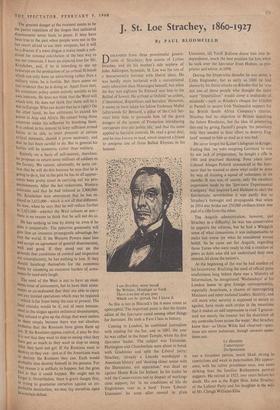J. St. Loe Strachey, 1860-1927
By PAUL BLOOMFIELD DESCENDED from three proconsular genera- tions of Stracheys; first cousin of Lytton Strachey and on his mother's side nephew of John Addington Symonds, St. Loe was the son of a Somersetshire baronet with liberal ideas. He was hardly more bothered with a conventional early education than Montaigne himself, but when the boy was eighteen Sir Edward sent him to the Balliol of Jowett. He arrived at Oxford 'an ardent, if theoretical, Republican and Socialist.' However, it seems to have taken his fellow freshman Mallet (afterwards Sir Bernard, a pillar of the Civil Ser- vice) little time to persuade him 'of the grave dangers of the system of Protection introducing corruption into our public life,' and that the same applied to Socialist controls. He read a great deal, and he was known to read, which inspired a friend to compose one of those Balliol Rhymes in his honour.
I am Strachey, never bored By Webster, Massinger or Ford.
There is no line of any poet Which can be quoted, but I know it.
As this is not in Hiscock's list it must count as apocryphal. The important point is that the future editor of the Spectator cared among other things for literature. He took a First Class in history.
Coming to London, he combined journalism with reading for the bar, and in 1885, the year he was called to the Inner Temple, wrote his first Spectator leader. The subject was Unionism. Hartington and Chamberlain were about to break with Gladstone and split the Liberal party; Strachey, 'already a Lincoln worshipper in American history' and 'desiring closer union with the Dominions, not separation,' was dead set against Home Rule for Ireland. In his leader he told the Conservatives not to despair of working- class support, for `in no conditions of life do Englishmen vote as a herd.' From 'Liberal- Unionism' he soon after moved to plain Unionism, till Tariff Reform drove him into in- dependence, much the best position for him when he took over the Spectator from Hutton, as pro- prietor and editor, in 1898.
During the Imperialist decades he was never a Little Englander, but as early as 1888 he had shown by his fierce attacks on Rhodes that he 'was not one of those people who thought the mere word "Imperialism" would cover a multitude of misdeeds'—such as Rhodes's cheque for £10,000 to Parnell to secure Irish Nationalist support for his British South Africa Company's charter. Strachey had no objection to Britain acquiring the future Rhodesias, but the idea of promoting this end by giving Parnell's people `the pecuniary help they needed in their effort to destroy Eng- land' seemed to him as mad as it was bad.
He never forgot the Kaiser's telegram to Kruger. Feeling that `we were tempting Germany to war by our lack of preparation,' he bought a rifle in 1901 and practised shooting. Four years later Colonel Alsager Pollock announced in the Spec- tator that he wanted to show what could be done by way of training a squad of volunteers in six months. It was not, of course, only the excellent impression made by the 'Spectator Experimental Company' that inspired Lord Haldane to start the Territorials; nevertheless it was partly due to Strachey's foresight and propaganda that when in 1914 war broke out 250,000 civilians knew one end of a rifle from the other.
The Asquith administration, however, put Strachey in a difficulty; he was too conservative to approve the reforms, but he had a Whiggish sense of what concessions it was indispensable to make lest worse (or what he considered worse) befell. So he came out for Asquith, regarding those Tories who were ready to risk a creation of peers as dolts who did not understand their own interest, let alone the nation's.
At the beginning of the war he had another of his brainwaves. Realising the need of official press conferences long before there was a Ministry of Information, he inaugurated `Wednesdays' at his London home to give foreign correspondents, especially Americans, a chance of interrogating Ministers and other national leaders. Security, and still more what security is supposed to secure us against, have made such strides in the meantime that it makes an odd impression to read `I guaran- teed not merely the honour but the discretion of my comrades from across the water.' But Strachey knew that—as Oscar Wilde had observed—ques- tions are never indiscreet, though answers some- times are.
Le directeur Conservateur Du Spectateur was a vivacious person, much liked, strong in convictions and weak in punctuation. His appear- ance, with his rather prominent nose, was more striking than the familiar Rothenstein portrait suggests. He retired in 1925, two years before his death. His son is the Right Hon. John Strachey of the Labour Party and his daughter is the wife of Mr. Clough Williams-Ellis.










































 Previous page
Previous page